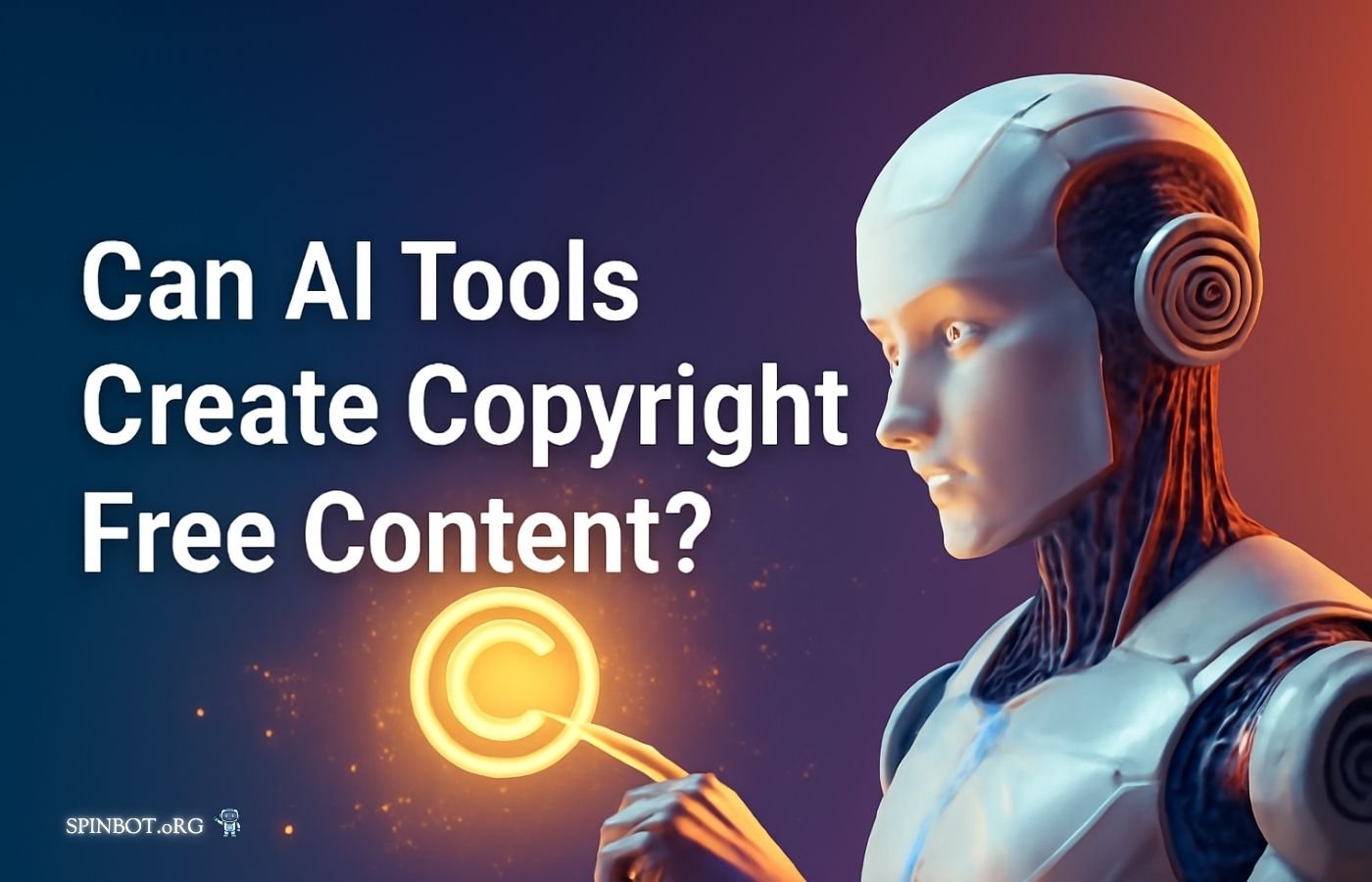In the fast-paced digital world, artificial intelligence (AI) is transforming the way we create content. From writing articles and generating images to producing music and videos, AI tools have become integral to the content creation process. But one of the critical questions emerging alongside this advancement is: Can AI tools create copyright-free content? This question holds significant implications for creators, businesses, and content platforms alike. In this article, we’ll dive deep into AI-generated content, copyright law, and explore whether AI can indeed produce content free from copyright restrictions.
Understanding Copyright Law
Before we can tackle the issue of AI-generated content and its relationship with copyright, it’s crucial to understand the fundamentals of copyright law.
What is Copyright?
Copyright is a legal concept that gives creators exclusive rights over their works, whether those works are books, music, art, or even digital content. Copyright protects the creator’s intellectual property, ensuring that no one can reproduce, distribute, or display their work without permission. In most countries, the work is automatically protected once it is created and fixed in a tangible medium (such as a digital file or printed on paper).
Types of Creative Works Covered by Copyright
Copyright law applies to a wide range of works, including:
- Literary works (books, articles, poems, software)
- Musical works (songs, compositions)
- Artistic works (paintings, sculptures, photographs)
- Dramatic works (plays, films)
The law allows the creator of a work to control how it is used, including whether others can reproduce or adapt it.
The Role of Copyright in Content Creation
For creators, copyright serves as a protection mechanism. It ensures that their intellectual property is not used without permission. Copyright is especially important in the digital world, where content can be easily copied, distributed, and modified.
The Rise of AI in Content Creation
AI tools are revolutionizing content creation by automating many of the tasks traditionally done by human writers, designers, and musicians. These tools can generate text, produce images, and even create videos all with minimal input from the user.
Types of AI Tools for Content Creation
AI tools come in various forms, and each has its unique capabilities:
- Text Generation Tools: Tools like OpenAI’s GPT-3 and ChatGPT can generate human-like text based on a simple prompt. These tools can write articles, blogs, essays, and more.
- Image Generation Tools: Tools like DALL-E can create images based on descriptive text prompts, offering infinite possibilities for visual content creation.
- Video Creation Tools: AI-based platforms like Synthesia use pre-programmed templates and human-like avatars to create video content quickly.
AI tools are making it easier for creators to produce high-quality content at scale. However, this raises a fundamental concern: Does AI-generated content pose any risks related to copyright infringement?
How AI Tools Generate Content
AI content generators work by using large datasets that include pre-existing material (text, images, or other media) to learn patterns, styles, and structures. When given a prompt, these tools generate new content based on the patterns they’ve learned. But this process is not entirely free from risk AI tools are often trained using content that is protected by copyright.
Can AI Tools Create Copyright-Free Content?
The main question here is: Can AI tools create truly copyright-free content? While AI can generate unique pieces of content, the nature of AI’s training data raises potential issues regarding copyright.
What Does Copyright-Free Mean?
Copyright-free content refers to works that are not protected by copyright law. This can mean:
- Public Domain Works: Works whose copyright has expired, or those that were never copyrighted in the first place.
- Creative Commons: Content that has been made available for free use under specific conditions.
For AI-generated content to be copyright-free, it must not infringe upon any existing copyrighted material. However, there’s a grey area in this regard.
Can AI-Generated Content Be Copyright-Free?
While AI can certainly generate new and original content, it’s important to note that the tools often rely on data that includes copyrighted material. This raises the question of whether AI-generated content is genuinely free from copyright restrictions.
- AI Content Based on Existing Data: AI systems like GPT-3 and DALL-E are trained on large datasets that often include copyrighted works. If AI generates content based on these datasets, there’s a potential risk that the content could be derivative or infringe upon existing works.
- Truly Original Content: If AI creates content that is entirely original and doesn’t rely on copyrighted material, there may be a case for it being copyright-free. However, proving that content is entirely original can be complex.
Can AI Tools Create Copyright-Free Content Without Copyright?
While AI can generate content that appears original, whether it’s free from copyright depends on several factors:
- The Training Data Used: AI systems are often trained on vast amounts of data that may include copyrighted material. If an AI tool generates content closely resembling copyrighted works, there could be issues with infringement.
- The Degree of Originality: If the AI content is sufficiently distinct from its training data, it may be considered original and, therefore, free from copyright restrictions.
- Human Involvement: In some cases, human involvement may be necessary to ensure the content generated by AI is sufficiently original and doesn’t violate copyright laws.
Copyright Protection for AI-Generated Works
One of the key issues in this debate is whether AI-generated works are eligible for copyright protection at all. In many jurisdictions, copyright law only grants protection to works created by humans.
Can AI Be an Author for Copyright?
The question of whether AI can be an author for copyright is a subject of legal debate. In traditional copyright law, authorship is typically granted to human creators. AI, as a machine, does not have legal personhood and cannot hold copyrights.
- Legal Precedents: In 2019, a U.S. court ruled that AI cannot be an author of copyrightable works. This decision emphasized that copyright laws are designed to protect human creators, not machines.
For content generated by AI to be copyrighted, a human creator (the user of the AI tool) would likely need to claim authorship, ensuring that the work falls under copyright protection.
Can AI Tools Create Copyright-Free Content for YouTube Videos?
AI tools are also becoming increasingly popular in creating content for YouTube. From automatically generated scripts to AI-created voiceovers, AI can play a significant role in YouTube content production. However, when it comes to copyright-free YouTube videos, there are several factors to consider.
Can AI Tools Create Copyright-Free Content on YouTube?
- AI-Generated Videos: AI can generate videos from scripts, images, and voiceovers, but there’s always the risk of using copyrighted material unknowingly, especially if the video incorporates pre-existing clips, music, or images.
- Music and Images: Many AI tools allow users to incorporate music and images in their videos. It’s essential to ensure that these assets are royalty-free or fall under a Creative Commons license.
If creators rely solely on AI-generated content and ensure all assets used are copyright-free, their videos may be eligible to be copyright-free as well.
AI Copyright Infringement
Even though AI tools offer a convenient way to create content, they also present risks related to copyright infringement. If an AI tool generates content based on copyrighted materials without proper permission, creators could face legal action.
What Could Make AI-Generated Content Ineligible for Copyright?
Several factors could make AI-generated content ineligible for copyright:
- Use of Copyrighted Data: If an AI tool uses copyrighted data without authorization, the resulting content may be considered derivative or infringing.
- Lack of Human Input: Some jurisdictions require human involvement in the creative process for copyright protection. If AI generates content without human intervention, it might not be eligible for copyright.
To avoid this, creators should ensure that they are using AI tools ethically and responsibly, and where possible, provide original input into the creative process.
Ethical Considerations in AI Content Creation
While AI offers numerous benefits in content creation, it is essential to consider the ethical implications of using these tools. Ethical content creation includes:
- Transparency: Creators should disclose when AI tools have been used in the production of content.
- Respect for Intellectual Property: AI should be used responsibly to ensure that it doesn’t infringe on others’ intellectual property rights.
- Accountability: If AI-generated content infringes on copyright, the creator must take responsibility, as AI tools themselves are not legally accountable.
Conclusion
AI tools are undoubtedly transforming the world of content creation, but the question remains: Can AI tools create copyright-free content? While AI has the potential to generate original and copyright-free content, the reality is more complex. The tools often rely on vast datasets that may include copyrighted material, raising concerns about infringement. To ensure copyright-free content, creators must be mindful of the tools they use, the data involved, and the originality of the content generated.
As the legal landscape surrounding AI and copyright continues to evolve, it’s crucial for content creators to stay informed and ensure they use AI ethically. By understanding copyright law, respecting intellectual property, and taking proactive steps, creators can leverage AI tools to produce innovative and copyright-compliant content.

AI writing strategist with hands-on NLP experience, Liam simplifies complex topics into bite-sized brilliance. Trusted by thousands for actionable, future-forward content you can rely on.

